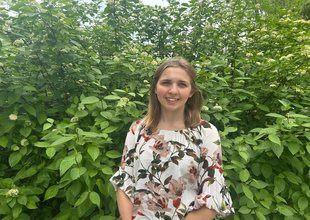Junior-Prof. Dr. Christopher Osterhaus
Entwicklungspsychologie im Handlungsfeld Schule
Christopher Osterhaus ist Junior-Professor für Entwicklungspsychologie im Handlungsfeld Schule. Nach seiner Promotion an der Pädagogischen Hochschule Freiburg war er Postdoc an der Ludwig-Maximilians-Universität München sowie an der University of Wisconsin-Madison.
Zentrale Forschungsthemen von Christopher Osterhaus sind die Entwicklung des wissenschaftlichen Denkens vom Kindergarten bis in die Sekundarstufe sowie die sozialkognitive Entwicklung. Im Bereich des wissenschaftlichen Denkens untersucht er, wann und wie Schülerinnen und Schüler lernen, ihre eigenen Hypothesen zu testen, Experimente aufzustellen oder einfache Datenmuster zu interpretieren. Im Bereich der sozialkognitiven Entwicklung beschäftigt er sich mit den Fähigkeiten von Kindern und Jugendlichen, sich in andere hineinzuversetzen und komplexe Gedanken und Gefühle zu verstehen.
Persönliche Website: costerhaus.com
Foto: (c) Friedrich Schmidt/Universität Vechta

Eine Übersicht über die Lehrveranstaltungen von Junior-Prof. Christopher Osterhaus finden Sie hier.
| seit Dez. 2020 | Junior-Professor für Entwicklungspsychologie im Handlungsfeld Schule, Universität Vechta |
| 2021 | Habilitation (Venia Legendi für Psychologie), LMU München |
| 2017 – 2020 | Postdoc, Entwicklungspsychologie und Pädagogische Psychologie, LMU München |
| 2016 – 2017 | Postdoc, Entwicklungspsychologie, University of Wisconsin-Madison (gefördert von der Alexander-von-Humboldt Stiftung) |
| 2016 | Promotion (summa cum laude) in Psychologie, Pädagogische Hochschule Freiburg |
| 2011 | MSc (Research) in Psychologie (mit Auszeichnung), Universität Amsterdam |
| 2010 | MA in Wissenschaftsphilosophie (mit Auszeichnung), Universität Amsterdam |
| 2009 | BA in Philosophie, Universität Amsterdam |
| 2007 | BSc (hons) in Psychologie, Universität Amsterdam |
Peer-Reviewed Journal Articles
2025, in press
Osterhaus, C., D’Urso, G., Koerber, S., & Bosacki, S. L. (2025). Theory of Mind, self-perceptions, and peer ratings of popularity in middle childhood and pre-adolescence. Children, 12(3), 281; https://doi.org/10.3390/children12030281
2024
Lecce, S., Mascheretti, S., Stagnitto, S., & Osterhaus, C. (2024). Individual differences in Theory of Mind and children’s advanced scientific reasoning in elementary school. International Journal of Behavioral Development. https://doi.org/10.1177/01650254241305545
Osterhaus, C., Lecce, S., & Koerber, S. (2024). Unlocking narratives: Longitudinal associations between Theory of Mind and reading comprehension. British Journal of Developmental Psychology., 42(4), 511–516. http://doi.org/10.1111/bjdp.12514
Osterhaus, C., & Koerber, S. (2024). The personal epistemology of parents predicts the development of scientific reasoning in children aged 6 to 10 years. Developmental Science, 27, e13474. https://doi.org/10.1111/desc.13474
Smogorzewska, J., Szumski, G., Bosacki, S. L., Grygiel, P., & Osterhaus, C. (2024). Longitudinal relations between theory of mind and academic achievement among deaf and hard-of-hearing school-aged children. Journal of Experimental Child Psychology, 239. https://doi.org/10.1016/j.jecp.2023.105806
2023
Osterhaus, C., & Koerber, S. (2023). The complex associations between children’s scientific reasoning and advanced theory of mind. Child Development, 94(1), e18–e42. https://doi.org/10.1111/cdev.13860
Osterhaus, C., Lin, X., & Koerber, S. (2023). Measuring scientific reasoning in kindergarten and elementary school: Validating the Chinese version of the Science-K Inventory. Educational Research for Policy and Practice. https://doi.org/10.1007/s10671-023-09332-9
Smogorzewska, J., & Osterhaus, C. (2023). A matter of style? Parenting behaviors of mothers of typically-developing children, children with mild intellectual disability, and deaf or hard-of-hearing children. European Journal of Developmental Psychology, 20(1), 86–106. https://doi.org/10.1080/17405629.2022.2039618
2022
Osterhaus, C., & Bosacki, S. L. (2022). Looking for the lighthouse: A systematic review of advanced theory-of-mind tests beyond preschool. Developmental Review, 64, 101021. https://doi.org/10.1016/j.dr.2022.101021
Osterhaus, C. (2022). „Wenn er weiß, dass sie weiß, was er denkt“ – Hängt die Entwicklung sozialkognitiver Fähigkeiten mit dem Schließen von Freundschaften im Grundschulalter zusammen? PraxisForschungLehrer*innenBildung, 4(5), 21–35. https://doi.org/10.11576/pflb-5733
Kloo, D., Osterhaus, C., Kristen‐Antonow, S., & Sodian, B. (2022). The impact of theory of mind and executive function on math and reading abilities: A longitudinal study. Infant and Child Development, 31(6), e2356. https://doi.org/10.1002/icd.2356
Nyberg, K., Koerber, S., & Osterhaus, C. (2022). Does task-specific self-efficacy predict science competencies? Journal of Education and Training Studies, 10(4). https://doi.org/10.11114/jets.v10i4.5585
Nyberg, K., Koerber, S., & Osterhaus, C. (2022). Self-effective scientific reasoning? Differences between elementary and secondary school students. Frontline Learning Research, 10(1), 22–45. https://doi.org/10.14786/flr.v10i1.955
Osterhaus, C., Kristen-Antonow, S., Kloo, D., & Sodian, B. (2022). Advanced scaling and modeling of children's theory of mind competencies: Longitudinal findings in 4- to 6-year-olds. International Journal of Behavioral Development, 46(3), 251–259 . https://doi.org/10.1177/01650254221077334
Koerber, S., & Osterhaus C. (2022). Does advanced theory of mind protect elementary-school children from loneliness? Longitudinal associations from 9 to 10 years. Journal of Genetic Psychology, 183(1), 1-8. https://doi.org/10.1080/00221325.2021.1994913
2021
Osterhaus, C., & Koerber, S. (2021). The development of advanced theory of mind in middle childhood: A longitudinal study from age 5 to 10 years. Child Development, 92(5), 1872–1888. https://doi.org/10.1111/cdev.13627
Smogorzewska, J., & Osterhaus, C. (2021). Advanced theory of mind in children with mild intellectual disability and deaf or hard-of-hearing children: A two-year longitudinal study in middle childhood. British Journal of Developmental Psychology, 39(4), 603–624. https://doi.org/10.1111/bjdp.12389
Opitz, T., Schuwerk, T., Paulus, M., Kloo, D., Osterhaus, C., Lesch, K.-P., & Sodian, B. (2021). No links between genetic variation and theory of mind development: A replication attempt of Lackner et al. (2012). Developmental Science, 24(5), e13100. https://doi.org/10.1111/desc.13100
Osterhaus, C., Brandone, A., Vosniadou, S., & Nicolopoulou, A. (2021). The emergence and development of scientific thinking during the early years: Basic processes and supportive contexts. Frontiers in Psychology, 12(387). https://doi.org/10.3389/fpsyg.2021.629384
Koerber, S., & Osterhaus, C. (2021). Science competencies in kindergarten: A prospective longitudinal study in the last year of kindergarten. Unterrichtswissenschaft, 49, 117–136. https://doi.org/10.1007/s42010-020-00093-5
Osterhaus, C., & Koerber, S. (2021). Social cognition in and beyond kindergarten: The relation between first-order and advanced theory of mind. European Journal of Developmental Psychology, 18(4), 573-592. https://doi.org/10.1080/17405629.2020.1820861
2020
Schwichow, M., Osterhaus, C., & Edelsbrunner, P. (2020). The relation between the control-of-variables strategy and content knowledge in physics in secondary school. Contemporary Educational Psychology, 63, 101923. https://doi.org/10.1016/j.cedpsych.2020.101923
Osterhaus, C., Putnick, D. L., Kristen-Antonow, S., Kloo, D., Bornstein, M. H., & Sodian, B. (2020). Theory of Mind and diverse intelligences in 4-year-olds: Modeling associations of false beliefs with children’s numerate-spatial, verbal, and social intelligence. British Journal of Developmental Psychology, 38, 580–593. https://doi.org/10.1111/bjdp.12336
Osterhaus, C., Koerber, S., & Sodian, B. (2020). The Science-P Reasoning Inventory (SPR-I): Measuring emerging scientific-reasoning skills in primary school. International Journal of Science Education, 42, 1087–1107. https://doi.org/10.1080/09500693.2020.1748251
Nyberg, K., Koerber, S., & Osterhaus, C. (2020). How to measure scientific reasoning in primary school: A comparison of different test modalities. European Journal of Science and Mathematics Education, 8, 137–144. http://scimath.net/articles/83/833.pdf
Koerber, S., & Osterhaus, C. (2020). Some but not all aspects of (advanced) Theory of Mind predict loneliness. British Journal of Developmental Psychology, 38, 144–148. https://doi.org/10.1111/bjdp.12302
2019
Knöchelmann, N., Krueger, S., Flack, A., & Osterhaus, C. (2019). Adults’ ability to interpret covariation data presented in bar graphs depends on the context of the problem. Frontline Learning Research, 7(4), 58–65. https://doi.org/10.14786/flr.v7i4.471
Koerber, S., & Osterhaus, C. (2019). Individual differences in early scientific thinking: Assessment, cognitive influences, and their relevance for science learning. Journal of Cognition and Development, 20(4), 510–533. https://doi.org/10.1080/15248372.2019.1620232
Osterhaus, C., Magee, J., Saffran, A., & Alibali, M. W. (2019). Supporting successful interpretations of covariation data: Beneficial effects of variable symmetry and problem context. Quarterly Journal of Experimental Psychology, 72, 994–1004. https://doi.org/10.1177/1747021818775909
2017 and before
Osterhaus, C., Koerber, S., & Sodian, B. (2017). Scientific thinking in elementary school: Children's social cognition and their epistemological understanding promote experimentation skills. Developmental Psychology, 53, 450–462. https://doi.org/10.1037/dev0000260
Koerber, S., Osterhaus, C., & Sodian, B. (2017). Diagrams support revision of prior belief in primary school. Frontline Learning Research, 5(1), 76–84. https://doi.org/10.14786/flr.v5i1.265
Osterhaus, C., Koerber, S., & Sodian, B. (2016). Scaling of advanced theory-of-mind tasks. Child Development, 87, 1971–1991. https://doi.org/10.1111/cdev.12566
Osterhaus, C., Koerber, S., & Sodian, B. (2015). Children’s understanding of experimental contrast and experimental control: An inventory for primary school. Frontline Learning Research, 3(4), 56–94. https://doi.org/10.14786/flr.v3i4.220
Koerber, S., Osterhaus, C., & Sodian, B. (2015). Testing primary-school children’s understanding of the nature of science. British Journal of Developmental Psychology, 33, 57–72. https://doi.org/10.1111/bjdp.12067
Koerber, S., Mayer, D., Osterhaus, C., Schwippert, K., & Sodian, B. (2015). The development of scientific thinking in elementary school: A comprehensive inventory. Child Development, 86, 327–336. https://doi.org/10.1111/cdev.12298
Chapters in Edited Volumes
Osterhaus, C. (2024). Die Entwicklung, Erfassung und Förderung des wissenschaftlichen Denkens in der Grundschule. In D. Graf, W. H. Honal, & F. Knoll (Eds.), Handbuch der Schulberatung. Mediengruppe Oberfranken – Fachverlage.
Osterhaus, C. (2023). Sich in andere hineinversetzen: Die fortgeschrittene Theory of Mind und ihre Bedeutung im Handlungsfeld Schule. In D. Graf, W. H. Honal, & F. Knoll (Eds.), Handbuch der Schulberatung. Mediengruppe Oberfranken - Fachverlage
Koerber, S., Sodian, B., & Osterhaus, C. (2022). Entwicklung des naturwissenschaftlichen Denkens. In J. Kahlert, M. Fölling-Albers, M. Götz, A. Hartinger, S. Miller, & S. Wittkowske (Eds.), Handbuch Didaktik des Sachunterrichts (3rd ed., pp. 355-360). Julius Klinkhardt.
Koerber, S., Sodian, B., Osterhaus, C., Mayer, D., Kropf, N., & Schwippert, K. (2017). Science-P.II. Modeling scientific reasoning in primary school. In D. Leutner, J. Fleischer, J. Grünkorn, & E. Klieme (Eds.). Competence assessment in education: Research, models and instruments (pp. 19-30). Springer.
Other (Publications in Science Magazines)
Osterhaus, C. (2023). El pensamiento de los demás. Mente y Cerebro, 12-16
Osterhaus, C. (2022). Das Denken der anderen. Gehirn&Geist, August 2022, 20-25.
Osterhaus, C. (2002). À quoi tu penses? Cerveau & Psycho, 149(1), 12-16

